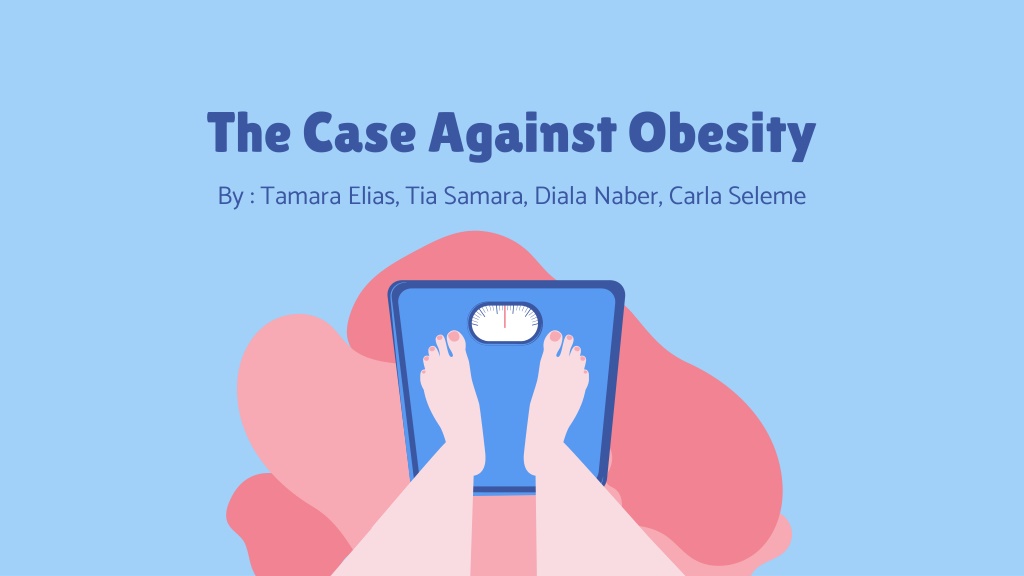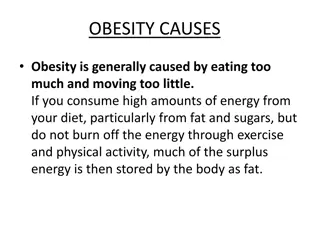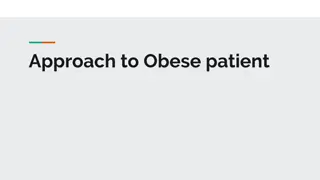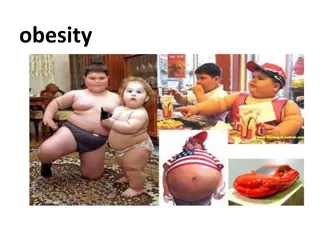Understanding Obesity: Causes, Consequences, and Prevention
Obesity is a health condition characterized by excessive weight gain, posing risks such as heart diseases, high blood pressure, and other serious health issues. Genetic factors, lifestyle choices like poor diet and lack of exercise, and health conditions contribute to obesity. The consequences of obesity include high blood pressure, joint problems, and gallbladder disease. Preventive measures include maintaining a healthy diet, regular exercise, and proper stress management. Awareness and proactive steps are crucial in combating the global obesity epidemic.
Download Presentation

Please find below an Image/Link to download the presentation.
The content on the website is provided AS IS for your information and personal use only. It may not be sold, licensed, or shared on other websites without obtaining consent from the author. Download presentation by click this link. If you encounter any issues during the download, it is possible that the publisher has removed the file from their server.
E N D
Presentation Transcript
The Case Against Obesity By : Tamara Elias, Tia Samara, Diala Naber, Carla Seleme
What is Obesity? Weight gain that is abnormal or excessive and poses a risk to health is what is meant by the terms "overweight" and "obesity." Overweight is defined as a body mass index (BMI) of 25, and obesity as a BMI of greater than 30. Obesity is also known as a health condition when a persons fat percentage is higher than the average amount. The higher the fat percentage of someone, the more likely to develop heart diseases,high blood pressure, etc
Causes Of Obesity 01 03 Genetics Health Conditions and Medications Families become obese when a single gene is altered. 02 04 Lack of sleep and stress When a person doesn t get the right amount of sleep and overstresses Food and exercise When people consume more calories than they burn through activity, they pick up weight.
Consequences Of Obesity High blood pressure and cholesterol are risk factors for heart disease Breathing problems such as asthma Joint problems Diseases that affect a persons joints Gallbladder disease When there is a blockage of stones in the gallbladder
How To Prevent Obesity Have a healthy diet Limiting Consume more foods with high- volume television, screen time
Our Solution Exercise frequently and follow a healthy low-calorie diet as the bet treatments for obesity. Eat a balanced, calorie-controlled diet as advice by doctors or a weight loss management health professional (such as a nutritionist) to do this, and sign up for a local weight loss group.
Our Aim We made this project to raise awareness about obesity and how it can affect a person socially and mentally as well as give solutions to help reduce the risk of obesity
Conclusion Obesity is a growing problem world wide, but its not just about appearance it can lead to serious health problems, that s why its important to make healthy choices and maintain a healthy weight
Chart of information about calories How many calories should an average person eat a day: How much calories an obese person eats a day: How does it affect the BMI: The recommended daily calorie intake is 2,000 calories a day for women and 2,500 for men. Obese individuals should consume 22 calories for every kilogram they weigh. At 136kg, their body needs about 2,992 calories daily High fat intake, high- fat diets, and high energy from fat were significantly associated with bodyweight, BMI, and the risk of overweight and obesity.
Resources https://www.mayoclinic.org https:// www.cdc.gov https://my.clevelandclinic.org























